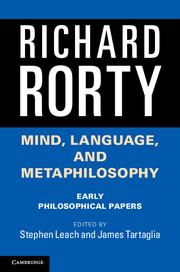Book contents
- Frontmatter
- Contents
- Foreword
- Acknowledgments
- Introduction
- 1 Pragmatism, categories, and language
- 2 The limits of reductionism
- 3 Realism, categories, and the “linguistic turn”
- 4 The subjectivist principle and the linguistic turn
- 5 Empiricism, extensionalism, and reductionism
- 6 Mind-body identity, privacy, and categories
- 7 Do analysts and metaphysicians disagree?
- 8 Incorrigibility as the mark of the mental
- 9 Wittgenstein, privileged access, and incommunicability
- 10 In defense of eliminative materialism
- 11 Cartesian epistemology and changes in ontology
- 12 Strawson’s objectivity argument
- 13 Verificationism and transcendental arguments
- 14 Indeterminacy of translation and of truth
- 15 Dennett on awareness
- 16 Functionalism, machines, and incorrigibility
- Index of names
- References
4 - The subjectivist principle and the linguistic turn
Published online by Cambridge University Press: 05 June 2014
- Frontmatter
- Contents
- Foreword
- Acknowledgments
- Introduction
- 1 Pragmatism, categories, and language
- 2 The limits of reductionism
- 3 Realism, categories, and the “linguistic turn”
- 4 The subjectivist principle and the linguistic turn
- 5 Empiricism, extensionalism, and reductionism
- 6 Mind-body identity, privacy, and categories
- 7 Do analysts and metaphysicians disagree?
- 8 Incorrigibility as the mark of the mental
- 9 Wittgenstein, privileged access, and incommunicability
- 10 In defense of eliminative materialism
- 11 Cartesian epistemology and changes in ontology
- 12 Strawson’s objectivity argument
- 13 Verificationism and transcendental arguments
- 14 Indeterminacy of translation and of truth
- 15 Dennett on awareness
- 16 Functionalism, machines, and incorrigibility
- Index of names
- References
Summary
To understand the needs which Process and Reality was intended to satisfy, one must understand Whitehead’s diagnosis of the state of modern philosophy: “The difficulties of all schools of modern philosophy lie in the fact that, having accepted the subjectivist principle, they continue to use philosophical categories derived from another point of view” (PR, p. 253). The plausibility of this diagnosis is brought out by the following considerations. The substance–property framework, which philosophical thought has taken over from ordinary language, leads us to think of everything to which we refer as either a substance or a property of a substance. The distinction between a substance and a property is the distinction between what is in principle unrepeatable and what is in principle repeatable, for substances are the referents of proper names, and properties the referents of predicates. Now when we think about knowing, we are led to the conception of the experiencing subject as a substance having, among its properties, mental states. When we ask for the relation of these states to that which is known, it appears natural to say that what we know are other substances. But these mental states are not substances. They must, then, be representations of substances. But our mental states, being properties of a substance, are in principle repeatable. So if they are representations, it seems that they can represent nothing but what is itself repeatable. Thus, it seems that our mental states cannot represent other substances, but only the properties of other substances.
- Type
- Chapter
- Information
- Mind, Language, and MetaphilosophyEarly Philosophical Papers, pp. 69 - 95Publisher: Cambridge University PressPrint publication year: 2014
References
- 3
- Cited by



